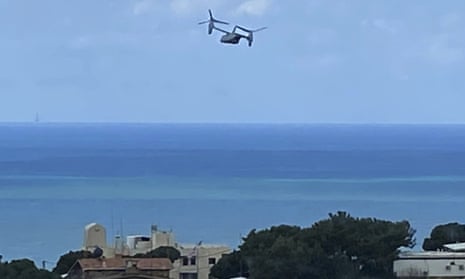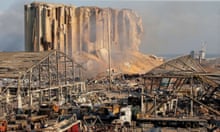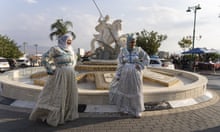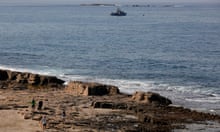A US citizen detained in Beirut on accusations of overseeing torture and murder at a southern Lebanese prison during Israel’s occupation of the region has been spirited out of the country by helicopter.
A Lebanese military tribunal ordered earlier this week that Amer Fakhoury, 57, be released after it ruled too much time had passed since his alleged crimes. It was not immediately clear whether he had been released, and a military prosecutor filed an appeal against the decision the next day.
The US secretary of state, Mike Pompeo, announced on Thursday that Fakhoury was “returning to the United States where he will be reunited with his family and receive urgent medical treatment”. His family says he has stage-four lymphoma.
The Guardian understands Fakhoury was picked up from the US embassy in Beirut’s northern suburbs early on Thursday afternoon by a US Marine V-22 Osprey helicopter.
#USAF Bell Boeing V-22 Osprey landed at the#US embassy in #Beirut, #Lebanon and left 10 minutes later. pic.twitter.com/Kvtp5WhgyI
— Aurora Intel (@AuroraIntel) March 19, 2020
He was a member of the South Lebanese Army, a militia that collaborated with Israel during its 18-year occupation of southern Lebanon starting in 1982. He was accused of overseeing the notorious Khiam prison, where human rights groups say hundreds of opponents of the occupation underwent torture and at least 10 people were killed.
Fakhoury’s lawyer, Celine Atallah, told the Guardian her client had worked in the prison but was never involved in or ordered torture. “His position at the Khiam prison was strictly logistical,” she said. “He had no contact with prisoners.”
Fakhoury fled Lebanon after the Israeli occupation ended in 2000 and moved to the US the following year, where he has since settled. He returned to Beirut last September, a year after an amnesty was passed for those who had collaborated with Israel during the occupation.
“He was granted assurances from high-ranked officials in Lebanon that the charges were dropped,” Atallah said.
His family said he was initially allowed into the country but had his passport confiscated at the immigration counter. The day he was asked to collect it, a pro-Hezbollah newspaper published a report saying “the butcher of Khiam” had returned to Lebanon. He was detained while trying to pick up the passport.
Fakhoury’s case has strained already tense relations between Washington and Beirut, and least one US senator had called for sanctions to be applied to force Lebanon to release him.
Donald Trump thanked the Lebanese government, whose ranks include members of the Shia militia and staunch Iranian ally Hezbollah. “We are very grateful to the Lebanese government for working with us and we are very proud of his family,” Trump said on Thursday.
His intervention in the case echoes his efforts to pardon Edward Gallagher, a US navy seal who was cleared of war crimes last year but jailed for discrediting the armed forces until the president pardoned him in November.
During the same press conference, Trump also called on Syria to release the freelance journalist Austin Tice, who has been missing since being kidnapped there in 2012. Trump said he was not confirming Tice, who would be 31, was alive, but said he had written a letter to the Syrian government asking for help.
“So Syria, please work with us,” Trump said. “And we would appreciate you letting him out. If you think about what we’ve done, we’ve gotten rid of the Isis caliphate for Syria. We’ve done a lot for Syria.”
Tice appeared blindfolded and in the custody of armed men in a video released a month after he disappeared, but he has not been seen or heard of since. The state department said in August 2018 that it believed he was still alive and in Syrian government custody.
Fakhoury’s case has been awkward for Lebanon’s political leaders, who hail from groups who fought against each other during the country’s 15-year civil war, but who have largely adhered to the 1989 power-sharing agreement that helped end the conflict. Few crimes committed during the fighting have been prosecuted.










